
Long Valley Caldera is a depression in eastern California that is adjacent to Mammoth Mountain. The valley is one of the Earth's largest calderas, measuring about 20 mi (32 km) long (east-west), 11 mi (18 km) wide (north-south), and up to 3,000 ft (910 m) deep.

Pagosa Springs is a home rule municipality that is the county seat, the most populous community, and the only incorporated municipality in Archuleta County, Colorado, United States. The population was 1,571 at the 2020 census. Approximately 65 percent of the land in Archuleta County is either San Juan National Forest, Weminuche and South San Juan wilderness areas, or Southern Ute Indian reservation land.

The geothermal areas of Yellowstone include several geyser basins in Yellowstone National Park as well as other geothermal features such as hot springs, mud pots, and fumaroles. The number of thermal features in Yellowstone is estimated at 10,000. A study that was completed in 2011 found that a total of 1,283 geysers have erupted in Yellowstone, 465 of which are active during an average year. These are distributed among nine geyser basins, with a few geysers found in smaller thermal areas throughout the Park. The number of geysers in each geyser basin are as follows: Upper Geyser Basin (410), Midway Geyser Basin (59), Lower Geyser Basin (283), Norris Geyser Basin (193), West Thumb Geyser Basin (84), Gibbon Geyser Basin (24), Lone Star Geyser Basin (21), Shoshone Geyser Basin (107), Heart Lake Geyser Basin (69), other areas (33). Although famous large geysers like Old Faithful are part of the total, most of Yellowstone's geysers are small, erupting to only a foot or two. The hydrothermal system that supplies the geysers with hot water sits within an ancient active caldera. Many of the thermal features in Yellowstone build up sinter, geyserite, or travertine deposits around and within them.

Lake Mohave is a reservoir on the Colorado River between the Hoover Dam and Davis Dam in Cottonwood Valley defining the border between Nevada and Arizona in the United States. This 67 mile stretch of the Colorado River flows past Boulder City, Nelson, Searchlight, Cottonwood Cove, Cal-Nev-Ari, and Laughlin to the west in Nevada and Willow Beach and Bullhead City to the east in Arizona. A maximum width of 4 miles wide and an elevation of 647 feet (197 m), Lake Mohave encompasses 28,260 acres of water. As Lake Mead lies to the north of the Hoover Dam, Lake Mohave and adjacent lands forming its shoreline are part of the Lake Mead National Recreation Area administered by the U.S. National Park Service.

Scovern Hot Springs is a thermal spring system, and former settlement in the Kern River Valley of the Southern Sierra Nevada, in Kern County, California.

Beppu Onsen (別府温泉) is an extensive hot spring system in the city of Beppu, Ōita, Japan. There are eight distinct major thermal spring zones called "Beppu Hatto".

Guadalupe Canyon is a canyon and valley in the southern portion of the Peloncillo Mountains Hidalgo County, New Mexico, Cochise County, Arizona and Agua Prieta Municipality, of Sonora. The waters of Guadalupe Canyon are tributary to the San Bernardino River joining it at its mouth at 31°13′33″N109°16′10″W just below Dieciocho de Augusto, Sonora. Its source is at 31°28′08″N109°02′21″W at an elevation of 6,160 feet on the south slope of Guadalupe Mountain. It crosses the border into Mexico at 31°19′57″N109°05′19″W at an elevation of 4,173 feet / 1,272 meters.

Pagosa hot springs is a hot spring system located in the San Juan Basin of Archuleta County, Colorado. The town of Pagosa Springs claim they are the world's deepest known geothermal hot springs.

Arizona (Ringbolt) Hot Springs, also known as simply Ringbolt Hot Springs or Arizona Hot Springs, is a group of three geothermal springs located near Hoover Dam, Arizona. They are located on the Lake Mead National Recreation Area.
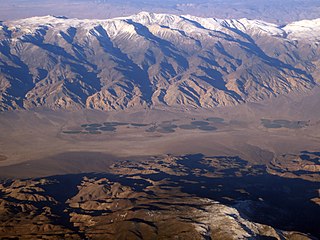
Fish Lake Hot Well, also known as Fish Lake Hot Spring and Fish Lake Valley Hot Well is a geothermal hot spring in Nevada.

Chena Hot Springs are a system of thermal mineral springs located within the Yukon-Tanana Plateau near the town of Chena Hot Springs, approximately 50 miles northeast of Fairbanks, Alaska.
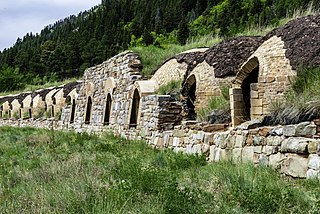
Penny Hot Springs is a geothermal spring located near the historic mining town of Redstone, Colorado.

Conundrum Hot Springs is a geothermal spring in a remote section of the Maroon Bells-Snowmass Wilderness area of the White River National Forest in Colorado Rocky Mountains.
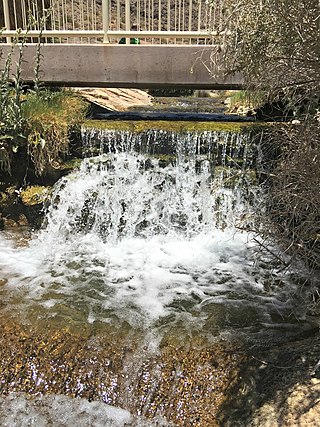
Rogers Warm Spring is a geothermal spring located in Clark County, Nevada near the town of Overton.

Crystal Springs hot springs is a system of geothermal springs and seeps near Ash Springs, located at the site of a ghost town, Crystal Springs, Nevada. Several marshes and springs are located along the White River.

Jordan Hot Springs is series of thermal mineral springs located in the Golden Trout Wilderness, Inyo National Forest, California.
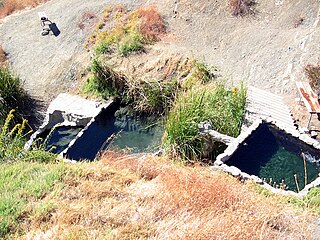
Big Caliente Hot Springs are a grouping of thermal mineral springs located in the Los Padres National Forest of California.
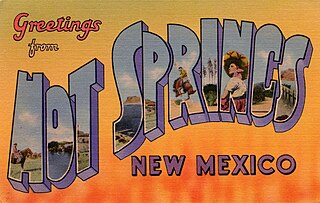
Truth or Consequences Hot Springs is a thermal spring system located in the Hot Springs Artesian Basin area of Truth or Consequences, New Mexico in Sierra County.
Hot Well Dunes is a hot spring in the San Simeon Valley of Arizona, located on BLM land southeast of the town of Safford.



















